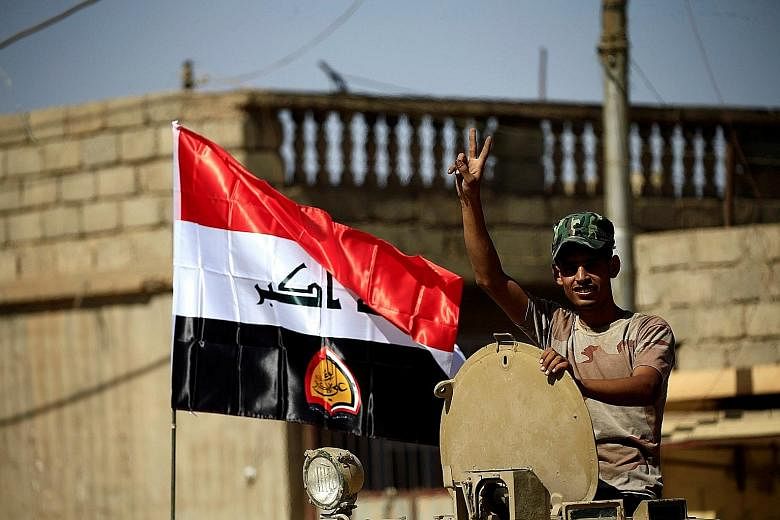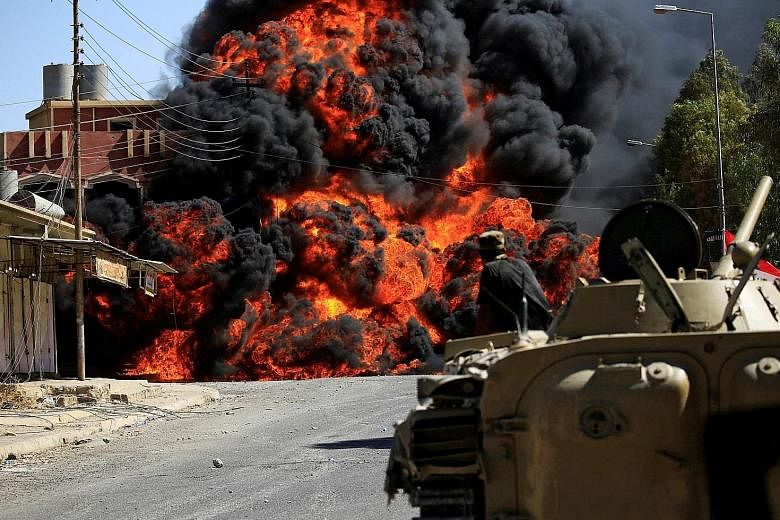TAL AFAR (Iraq) • Iraqi forces are about to take full control of Tal Afar, a stronghold of terror group Islamic State in Iraq and Syria (ISIS) in north-western Iraq, in a swift campaign against the outnumbered, exhausted militants, an Iraqi military spokesman said yesterday.
The quick collapse of ISIS in Tal Afar, a breeding ground for militant groups, confirmed Iraqi military reports that the militants lack command and control structures in the areas west of Mosul.
Up to 2,000 militants were believed to be defending Tal Afar when the United States-backed campaign to take back the city started last Sunday. The attacking forces were estimated at 50,000, according to Western military sources.
"Tal Afar city is about to fall completely into the hands of our forces, only 5 per cent remain" under ISIS control, a military spokesman said.
"God willing, the remaining part will be liberated soon," Iraqi Foreign Minister Ibrahim al-Jaafari said earlier at a news conference with his French counterpart, Mr Jean-Yves Le Drian, and French Defence Minister Florence Parly in Baghdad.
France will assist in reconstruction and reconciliation efforts in Iraq as it emerges from the war with ISIS, Mr Le Drian said at the news conference. "We are present in the war and we will be present in the peace," he added. "Even if our joint combat against Daesh is not finished, it is entering a phase of stabilisation, of reconciliation, of reconstruction, a phase of peace," Mr Le Drian said, referring to ISIS by its Arabic acronym.
France is a main partner in the US-led coalition helping Baghdad to fight the militants who seized parts of Iraq and Syria in 2014.
The coalition provided key air and ground support for Iraqi forces in the nine-month campaign to take back Mosul, ISIS' capital in Iraq.
Tal Afar lies on the supply route between Syria and Mosul, 80km to the east.
The elite Counter-terrorism Service "liberated the citadel neighbourhood... and raised the Iraqi flag on top of the citadel building", a statement from the Iraqi joint operations command said.
Much of the Ottoman-era citadel itself was destroyed by the militants at the end of 2014.
The city has produced some of the militant group's most senior commanders. It experienced cycles of sectarian violence between Sunnis and Shi'ites after the US-led invasion of Iraq in 2003.
Tal Afar, which had a pre-war population of about 200,000, is the latest objective in the US-backed war on ISIS following the recapture of Mosul after a nine-month campaign that left much of the city, the biggest in northern Iraq, in ruins.
The fall of Mosul in effect marked the end of the self-proclaimed "caliphate" ISIS declared over parts of Syria and Iraq in 2014. Tal Afar was cut off from the rest of ISIS-held territory in June.
The number of civilians believed to have remained in the city at the start of the offensive was estimated at between 10,000 and 20,000 by the US military. As in the battle for Mosul, civilians are suffering badly.
Waves of residents fled the city in the weeks before the battle started. Those remaining were threatened with death by the militants, who had held a tight grip there since 2014, according to aid organisations and residents who managed to flee.
Last Tuesday, the United Nations High Commissioner for Refugees said those who had fled were suffering from dehydration and exhaustion, having lived on bread and dirty water for three to four months. People were arriving at camps for displaced people with wounds from sniper fire and mine explosions.
REUTERS


